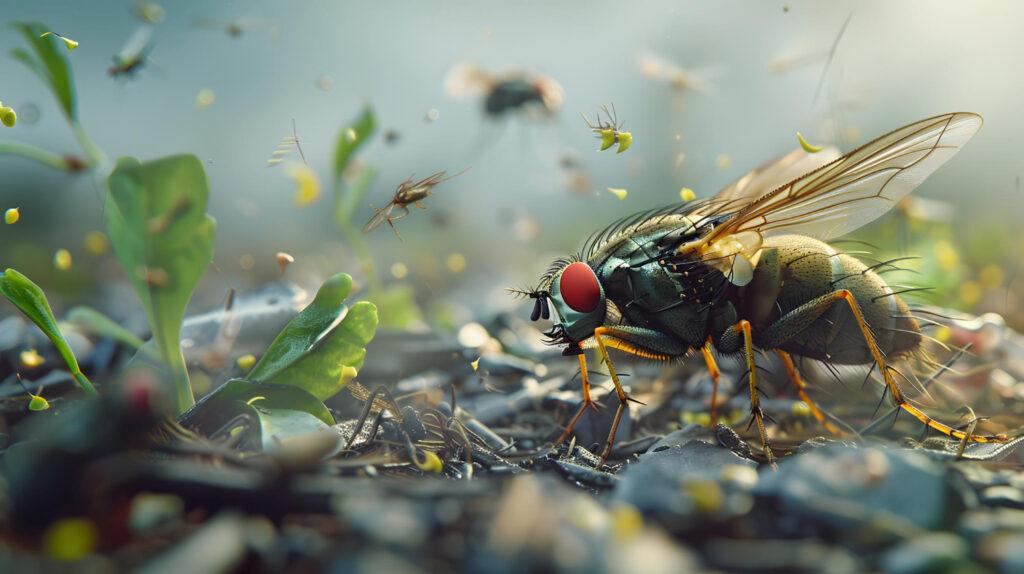Have you ever wondered, “How long do flies live?” This simple question has intrigued many, especially with the common myth that their lifespan is only 24 hours.
In reality, understanding the life cycle of a fly not only debunks this misconception, but is also essential for effectively managing fly infestations that can be both annoying and hazardous.
What Factors Influence a Fly’s Lifespan?
Understanding the various factors that influence a fly’s lifespan can help in predicting their behavior and effectively managing their populations.
Species of Flies
Different species of flies live for varying periods. While the house fly is perhaps the most renowned, its life span can differ significantly from that of other fly species. For instance, house flies typically live for about 15 to 25 days, making them one of the most common and persistent pests in and around homes.
Temperature and Environmental Conditions
Environmental conditions, especially temperature, play a crucial role in determining a fly’s life span. Warmer temperatures generally accelerate the development process, shortening the lifecycle. Conversely, in colder climates, flies may live longer as the temperatures slow down their metabolic rate, extending each stage of their lifecycle.
Availability of Food Sources
A fly’s access to food can significantly impact its life span and reproductive cycle. With an abundance of food, such as rotting fruit or animal waste, flies not only thrive but also reproduce rapidly, leading to larger populations.
The Life Cycle of a Fly
An in-depth look at the life cycle of a fly reveals four distinct stages, each crucial in understanding its longevity and behavior.
- Eggs
- Larvae (Maggotts)
- Pupae
Eggs
Flies lay their eggs in decaying organic matter such as food waste or feces. The conditions found in these environments support their rapid development, with eggs typically hatching within 7–8 hours.
Larvae (Maggots)
Once hatched, the larvae, commonly known as maggots, feed voraciously on their surrounding environment. This stage lasts around 3 to 5 days, depending on food availability and temperature, and is critical for growth before transitioning to the pupa stage.
Pupae
During the pupal stage, maggots metamorphose into adult flies. The pupal case provides protection during this transformation, lasting about a week. Here, environmental conditions can either hasten or delay emergence.
Adult Fly
The adult stage of a fly is perhaps the most familiar. Adult house flies, for instance, have a life span of about 15 days for males and up to 25 days for females. Factors such as food accessibility and environmental temperatures heavily influence this final stage of life.
Do Flies Really Live Only 24 Hours?
The notion that flies live just a day is more myth than fact. This misconception likely arises from observing certain stages or behaviors of flies that seem transient. However, as discussed, the house fly lives substantially longer, dispelling this myth once and for all.
Why Do Flies Seem to Be Everywhere?
Fast Reproduction
Flies have an incredible ability to reproduce swiftly, with females capable of laying between 500 to 700 eggs in their lifetime. This rapid reproductive rate contributes to how quickly populations can expand, especially during the warmer months.
What Attracts Flies to Your Home?
Flies are drawn to places with plentiful food sources. Common attractants include garbage, leftover food, pet wastes, and other decomposing materials. Maintaining cleanliness in and around the home and properly managing waste can significantly reduce the appeal of your property to flies.
How Long Do Different Types of Flies Live?
House Fly
The common house fly typically survives for 15 to 25 days under favorable conditions, making them persistent pests in domestic areas.
Fruit Fly
With a slightly longer life span of 30 to 50 days, fruit flies are tenacious pests, thriving especially in kitchens where fermented food and beverages are present.
Horse Fly
Horse flies, known for their painful bites, can live up to 60 days. Their presence can be particularly problematic in rural and farm settings.
Other Species
Other fly species, such as drain flies and blowflies, also have varying lifespans, ranging based on environmental conditions and species-specific behaviors.
Can Flies Live Longer Than Expected?
Overwintering in Flies
Certain flies adapt to colder months through a process called overwintering, during which they become dormant and extend their lifespan until favorable conditions return.
Controlled Environments
In controlled environments, such as research labs, flies can sometimes live longer due to constant temperatures and optimal feeding conditions, providing further insights into their lifespans and behaviors.
The Health Risks Associated with Flies
Disease Transmission
Flies play a significant role in disease transmission, carrying pathogens on their bodies that can contaminate food and surfaces, posing serious health risks to humans.
Contamination of Food
Preventing flies from contacting food and kitchen surfaces is crucial in avoiding contamination. Simple measures like covering food and maintaining hygiene can reduce interactions with these pests.
Tips to Control Flies Indoors and Outdoors
Effective fly control hinges on maintaining cleanliness and proper waste management. Employing fly traps and screens, along with regular cleaning, can significantly minimize fly populations within and around your home.
Conclusion
In summary, flies live much longer than the often-quoted 24 hours and understanding their lifespan and lifecycle is integral to effective pest management. By comprehending the stages they go through and the factors affecting their longevity, we can devise better methods to control their presence.
FAQs
Do all flies live for 24 hours?
Despite the widespread myth, not all flies live for just 24 hours. Many, like the common house fly, live for several weeks.
How long does a house fly live without food?
House flies can survive for about two to three days without food, depending on environmental conditions.
How can I get rid of flies in my house?
Removing flies involves cleanliness, eliminating food sources, and using traps to curtail their presence effectively.
What is the longest-living fly species?
Horse flies are among the longest-living fly species, with life spans reaching up to 60 days, depending on their environment and conditions.


